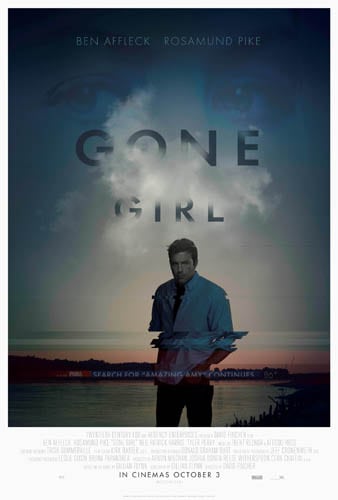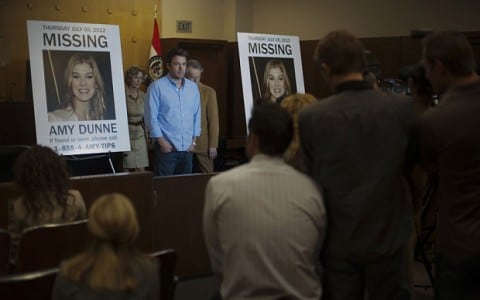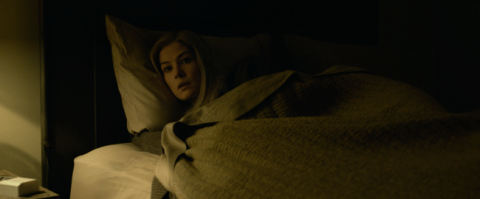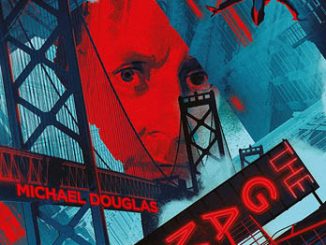Gone Girl (2014)
Directed by: David Fincher
Written by: Gillian Flynn
Starring: Ben Affleck, Neil Patrick Harris, Rosamund Pike, Tyler Perry
USA
IN CINEMAS NOW
RUNNING TIME: 149 min
REVIEWED BY: Dr Lenera, Official HCF Critic
On the day of his fifth wedding anniversary, Nick Dunne returns home to find that his wife Amy is missing. Her disappearance creates a media frenzy, and his awkward behaviour and lies surrounding the marriage are interpreted by the media and public as characteristics of a sociopath, implicating him for her apparent murder, something in which his sister may have aided him. Flashbacks begin to tell us of an initially happy relationship which began to disintegrate when they both lost their jobs….
It’s always a pleasure when you expect to majorly criticise a film which you are convinced is going to be poor in a review, and then end up praising it instead. Gone Girl is actually badly flawed in at least two major aspects, but I’m still happy that at last I was able to enjoy a film from David Fincher again. I felt that, after the superb Zodiac, this director all but lost his mojo. The Social Network was almost as dull as you would expect a film about the creation of Facebook to be [which means that it’s little wonder it won Best Screenplay at the Academy Awards], and what on earth made Fincher think that he, a filmmaker who steadfastly avoids sentimentality, was a good choice for a weird remake of Forrest Gump? His welcome return to darker, edgier material with The Girl With The Dragon Tattoo could have been good with 45 minutes shaved off it, but was still somewhat lacking. This was all from a director whose next project I used to get really excited about – hell, I even really liked Alien 3 before it was fashionable to do so and in its studio cut.
Well, Gone Girl, even though it has its problems, sees Fincher back on form. Part twisted satire on marriage, and part twisty, dark thriller, it’s constantly gripping even when not relying much on typical ‘thrills’, partly because of its palpable feeling of unease, and it certainly doesn’t seem overly long for the material despite its considerable running time. In fact, there are times I think it would actually benefit from being longer, especially in the first half. It also has – shock horror – a pretty good performance from Ben Affleck! Wonders will never cease. The film even feels like it’s aware of how awful he usually is by having a scene where his character is ‘trained’ to give a good performance in a TV interview. The two chief problems are a very awkward and unconvincing, if still fitfully entertaining, first third and a god-awful ending which would have normally sent me out of the cinema in a bad mood but didn’t because what was in-between was so good and so much better than expected. In fact my advice is to leave the theatre a few minutes before the end and make up your own conclusion, because whatever it is it would probably be a hell of a lot better than what writer Gillian Flynn, who had an opportunity to improve on the conclusion of her own novel and failed to, came up with!
We begin the film in quite a disorientating fashion as we hear Nick’s unspoken thoughts on marriage as Amy is right beside him, then for a while flit between two time periods: the present, where Nick is being investigated for the disappearance of his wife, and the past, which unlike the present is from Amy’s point of view as she relates the story of their relationship, marriage and, hopefully, the truth behind her disappearance. While the editing between the two tales is superbly managed – Kirk Baxter doing his usual great job for Fincher- it really is like watching two films of wildly differing quality. The present day part is mostly very good. The viewer is superbly manipulated into constantly changing their views on Nick and, as he becomes a nationwide celebrity, there’s much timely commentary on the nature of celebrity, public perception and how minds are easily changed. Kim Dickens and Patrick Fugit are superb as the two main cops investigating who have differing views. We learn just enough about their characters and many of their scenes have a welcome Zodiac feel about them. Unfortunately the other part is badly burdened by poor dialogue of the kind that the writer no doubt thinks is pointed but which is doubtful the characters would actually say, and too many really short scenes which don’t let us feel we’ve got to know this couple enough. The latter may be deliberate, but the distancing effect means that we don’t really care about or even like these people much. “We’re so cute I could punch us in the face”, says Amy at one point, which I guess is supposed to sound cool and edgy and anti-romantic. Still, it’s somewhat amusing if all this is taken as Fincher’s version of a ‘rom-com’. The couple meet and they go walking arm in arm through the city at night when they’re suddenly enveloped by clouds of icing sugar that come billowing out of a baker’s window. As they kiss, we then cut to him ‘going down’ on her and her saying: “Are you done yet?”, then: “I really like you”. And eventually some tension does mount up as it seems that Nick could be a very dangerous husband indeed.
It is here, at around the halfway point, where the film suddenly performs a superbly executed turn and shows that it’s been skilfully wrong-footing the audience up to now. It then becomes a bit more of a thriller, throwing twists and turns at the viewer, and the sense of dread almost becomes as strong as it was in Seven. It’s not giving too much away to say that Amy takes refuge in the house of Desi, an old admirer who once [supposedly] stalked her but seems to be the only available person she can turn to. Their scenes have a really uneasy, even unpleasant, tension about them, as if one is about to attack the other at any moment. It’s brilliantly achieved and yet quite subtle. There isn’t much violence overall, but even during sex scenes there is an odd sense of disgust – they certainly aren’t erotic – and Fincher throws in one rather strikingly bloody killing during sex that could be one of the most shocking screen deaths of the year. The film maintains its icy grip and despite hardly being a fast-paced affair you may very be on the edge of your seat wondering how it’s going to pan out and not think about some of the less believable aspects of the story. But then we get to that ending, and it really is a letdown. Fincher and Flynn wanted to get away from the usual desperate fight to the finish with one of the two main characters trying to kill the other one, but what we are presented with is something that is incredibly unbelievable and extremely inconsistent considering one of the two characters’ thoughts on the other.
Though the writer has denied this about her work, there seems to be a certain unwelcome feminist agenda about the film, from the way we don’t explore the man’s side of things nearly as much as the woman’s, to the way certain bad things the woman does almost seem to be celebrated in contrast with the man who constantly seems to get what’s coming to him. Despite his good efforts, Affleck really has far less of a character to play then Rosamund Pike, who really makes the most of what is a stunning performance which requires her to run the full gamut from victim to aggressor, from bland to multi-dimensional, and much more besides. It is, quite simply, a revelation, though typically for a Fincher film Gone Girl is crammed with strong performances – he even gets a good one from Tyler Perry. Meanwhile Fincher’s direction is full of cold precision though it really has become far less stylish than it used to be and I yearn for his old bravura to return. Many directors adopt a more naturalistic style after their early days though so it’s not anything out of the ordinary. There is a nice knowingness about Gone Girl in that it sometimes seems to touch base with some of his earlier films, and he always seems in control of the story even when parts of it don’t quite work.
The ambient soundscapes of Trent Reznor and Atticus Ross are an essential ingredient in the effect of the film. I’m not a fan of their way of scoring films [writing endlessly repetitious pieces which Fincher then inserts into the films wherever he wants], but it works wonders here, sometimes increasing the brooding tension to something almost unbearable. Some of the early scenes may have benefitted from more conventional scoring or no scoring at all, though the incongruous feel that results instead was clearly the effect that was intended. Despite a few problems, Gone Girl is one of those films that will stick with you for a very long time [I certainly can’t stop thinking about it], and is definitely a return to form to Fincher, even if its ruminations on relationships, marriage and how one cannot always truly know those close to you show a truly dark heart, if indeed it has one at all, at its centre. And, while that ending will probably always dissatisfy, the more I think about it, I suppose it’s almost appropriate if you consider Gone Girl as, more than anything else, a pitch-black, absurd comedy. In that respect, the closest of Fincher’s films it comes to is Fight Club, his masterpiece. Judging by Gone Girl, he could, one day, have another masterpiece like that in him.
Rating: 

















Be the first to comment